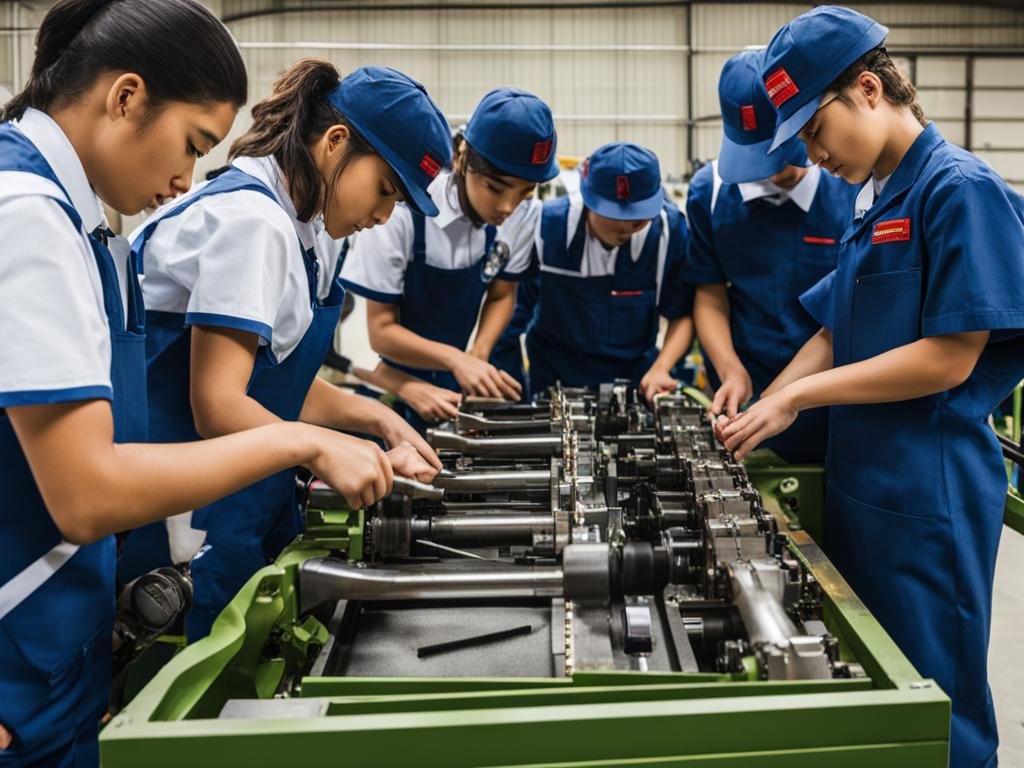What Is A Technical School : Are you curious about technical schools and their role in providing career-focused education? Look no further! In this guide, we’ll explore the definition of a technical school, its significance in technical education, and how it differs from other types of institutions like vocational and trade schools.
Technical schools, also known as vocational schools or trade schools, offer specialized education and training to prepare students for specific careers in skilled trades. These institutions prioritize hands-on training and job skills, focusing on practical knowledge rather than academic subjects. Over the years, the demand for trade schools has been on the rise due to a shortage of skilled workers in various industries.
Technical schools cover a wide range of programs that cater to different industries, such as construction, cosmetology, healthcare, and more. They provide an alternative pathway to traditional four-year colleges, offering faster entry into the workforce.
Key Takeaways:
- Technical schools are also known as vocational or trade schools.
- They focus on hands-on training and job skills.
- Trade schools have seen an increased demand due to a shortage of skilled workers.
- These schools offer programs in various industries.
- Technical schools provide an alternative to traditional four-year colleges for faster entry into the workforce.
What is the Difference Between Technical College and Trade School?
When it comes to technical education, two common options are technical colleges and trade schools. While they both provide skills-based education and hands-on learning opportunities, there are some key differences between the two.
Technical colleges offer a broader range of programs and typically span one to two years, leading to associate degrees or certifications. These programs strike a balance between technical training and general education courses. On the other hand, trade schools focus solely on specific trades and offer hands-on learning and skill-based education without extensive general education requirements. Trade school programs often offer quicker pathways to workforce entry compared to traditional colleges.
In summary, the main difference lies in the focus and educational offerings. Technical colleges provide a wider range of programs, including general education courses, while trade schools specialize in specific trades and offer more direct career pathways. The choice between the two depends on the individual’s career goals and preferences for a more comprehensive education or a shorter, specialized program.
Table: Comparing Technical College and Trade School
| Technical College | Trade School |
|---|---|
| Offers a broader range of programs | Specializes in specific trades |
| Includes general education courses | No or limited general education requirements |
| Typically leads to associate degrees or certifications | Offers certificates or diplomas |
| Potential transferable credits for further education | No or limited transferable credits |
| Longer program duration | Shorter program duration |
Pros and Cons of Technical Schools
Technical schools provide a unique approach to education, focusing on technical training, skills-based education, and hands-on learning. While they offer several advantages, it’s essential to consider the potential drawbacks as well.
Pros of Technical Schools
- Specialized Training: Technical schools offer programs that are tailored to specific careers, providing focused training in areas such as automotive technology, culinary arts, healthcare, and more.
- Small Class Sizes: With smaller class sizes, students can receive more personalized attention from instructors and have more opportunities for hands-on training.
- Faster Entry into the Workforce: Technical school programs typically have shorter durations compared to traditional college degrees, allowing students to start their careers sooner.
- Potentially Lower Costs: In comparison to four-year degrees, technical school programs may have lower tuition costs, providing a more affordable option for students.
Cons of Technical Schools
- Potentially High Costs Depending on the Program: While technical schools can be cost-effective, certain programs may have higher tuition fees, depending on the industry and training requirements.
- No Guarantee of Job Placement: While technical schools focus on career preparation, there is no guarantee of immediate job placement upon graduation. Students still need to actively search for employment opportunities.
- Limited Transferable Credits: Technical school credits may not be easily transferable to other educational institutions, limiting the possibilities for further education or credit recognition.
- Need to Balance School with Work: Technical school programs often have limited scheduling options, which may require students to balance their studies with part-time or full-time work.
It’s crucial for students to weigh the pros and cons of technical schools before making a decision. Considering factors such as cost, program duration, job placement rates, and individual career goals can help determine if a technical school is the right choice for their career path.
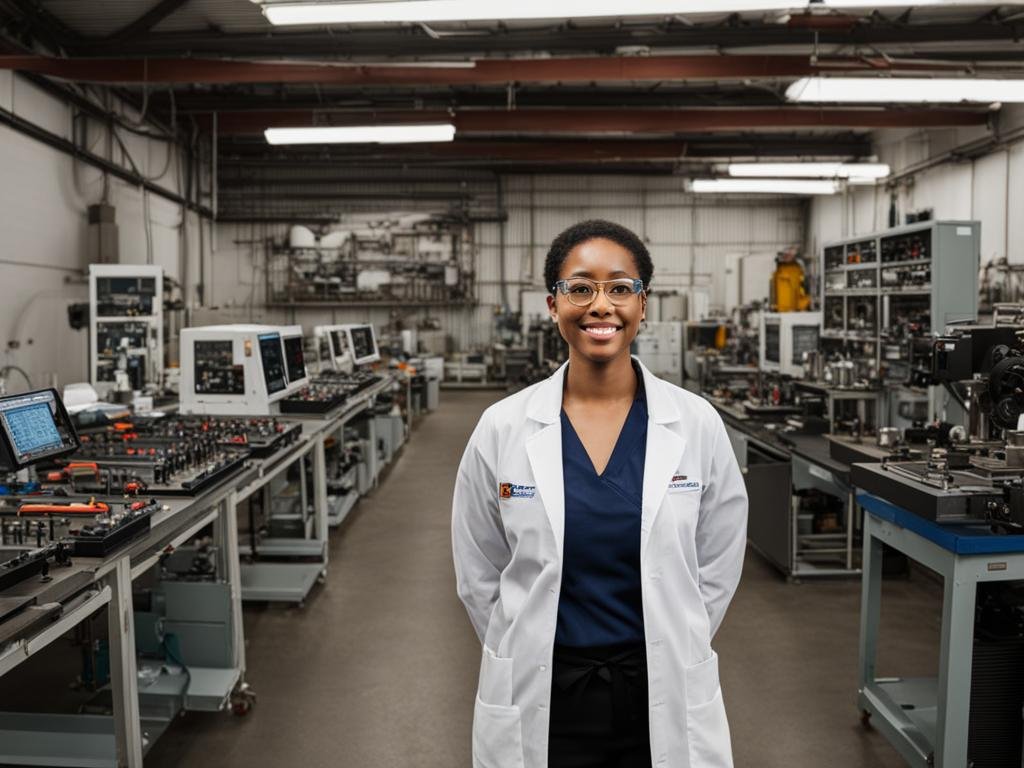
Vocational Education and Trade Schools: Pathways to Specific Careers
Vocational education plays a crucial role in providing students with the skills and training necessary for specific job roles. Trade schools are institutions that specialize in offering hands-on training and education for particular trades. These schools equip students with the knowledge and practical skills required to excel in their chosen careers.
Trade schools offer a range of programs that focus on specific jobs, such as carpentry, culinary arts, automotive technology, and more. Students at trade schools receive specialized training that prepares them for these specific professions, allowing them to enter the workforce with the necessary skills and certifications. These programs often have shorter durations compared to traditional colleges, enabling students to quickly start their careers.
Trade schools provide students with the opportunity to gain valuable hands-on experience and expertise in their chosen field. The technical training received at these schools is highly practical and prepares graduates for the challenges they will face in their specific job roles.
Upon completing a program at a trade school, students typically receive certificates or diplomas that validate their skills and expertise. These credentials serve as proof of their qualifications when seeking employment, giving them a competitive edge in the job market. Graduates of trade schools can pursue various career paths, depending on the trade they have specialized in, opening up opportunities in industries such as construction, healthcare, cosmetology, and more.
| Pros of Trade Schools | Cons of Trade Schools |
|---|---|
| Specialized training for specific job roles | High program costs |
| Hands-on learning and practical experience | No guarantee of job placement |
| Quicker entry into the workforce | Limited transferable credits |
| Potentially lower costs compared to a four-year degree | Need to balance school with work due to limited scheduling options |
Pros and Cons of Trade Schools
Trade schools have gained popularity in recent years due to their career-focused approach and hands-on training. They offer specific training programs tailored to industries such as automotive technology, healthcare, cosmetology, and more. However, like any educational path, trade schools have both advantages and disadvantages to consider.
Pros of trade schools include:
- Career-Focused Education: Trade schools provide specialized training that prepares students for specific careers, allowing them to develop the skills and knowledge required in their chosen field.
- Hands-On Training: Trade schools emphasize practical, hands-on learning experiences, giving students the opportunity to apply their knowledge in real-world scenarios and gain valuable skills.
- Specific Training: Trade schools focus on a particular trade, allowing students to gain expertise in their chosen field and enter the workforce with specialized knowledge.
- Employment Guarantee: Some trade schools offer job placement assistance, increasing the likelihood of finding employment after graduation.
- Cost: Trade school programs are often more affordable compared to traditional four-year colleges, offering potential cost savings for students.
- Earning Potential: Many trades offer competitive salaries, providing graduates with the potential to earn a good living.
However, there are also potential drawbacks to consider:
- High Program Costs: Depending on the program, trade schools can have significant tuition costs, which may require students to take on loans or financial obligations.
- No Employment Guarantee: While some trade schools offer job placement assistance, there is no guarantee of employment after graduation, and students may need to actively seek out opportunities.
- Limited Transferable Credits: Unlike traditional colleges, trade school credits may not be transferable to other institutions if students decide to pursue further education.
- Scheduling Options: Trade schools often have limited scheduling options, which can be challenging for students who need to balance school with work or other responsibilities.
When deciding whether to pursue a trade school education, it is important for individuals to carefully weigh the pros and cons, considering factors such as their career aspirations, financial situation, and personal learning preferences.
Table: Pros and Cons of Trade Schools
| Pros | Cons |
|---|---|
| Career-Focused Education | High Program Costs |
| Hands-On Training | No Employment Guarantee |
| Specific Training | Limited Transferable Credits |
| Employment Guarantee | Scheduling Options |
| Cost Savings | |
| Earning Potential |
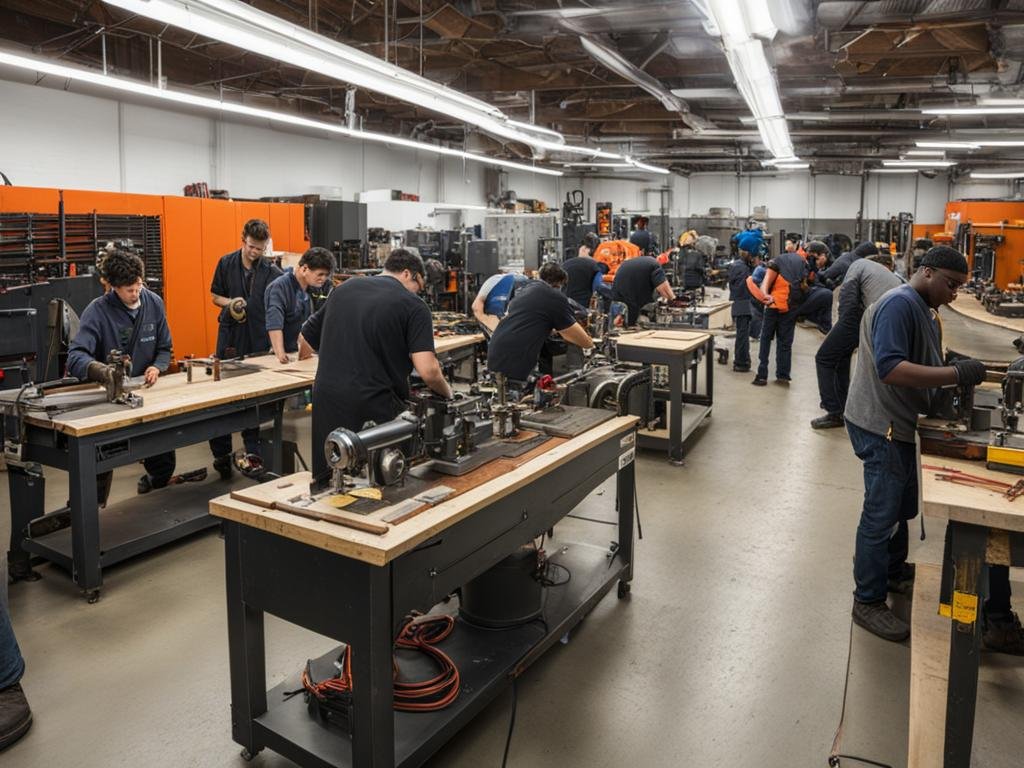
What is a Technical College?
A technical college is a higher education institution that focuses on career preparation. These colleges offer a range of programs, including associate degrees and sometimes bachelor’s degrees, in various fields such as automotive technology, dental hygiene, information technology, and more. Technical colleges aim to equip students with the skills and knowledge needed for specific careers in the workforce. Some technical colleges also offer vocational programs that can be completed in less than two years, providing faster pathways to job entry.
Unlike traditional four-year colleges, technical colleges typically have fewer general education requirements. This allows students to focus more on career-related coursework and gain hands-on experience in their chosen field. Technical colleges often provide specialized training and practical skills that directly align with the demands of the job market. Graduates of technical college programs may also have the opportunity to earn industry certifications, further enhancing their employability.
One of the advantages of attending a technical college is the potential for transferable credits. If students decide to further their education or pursue a bachelor’s degree later on, the credits earned at a technical college may be recognized by other institutions. This flexibility can save students time and money in the long run, as they can build upon their technical college education to pursue higher degrees.
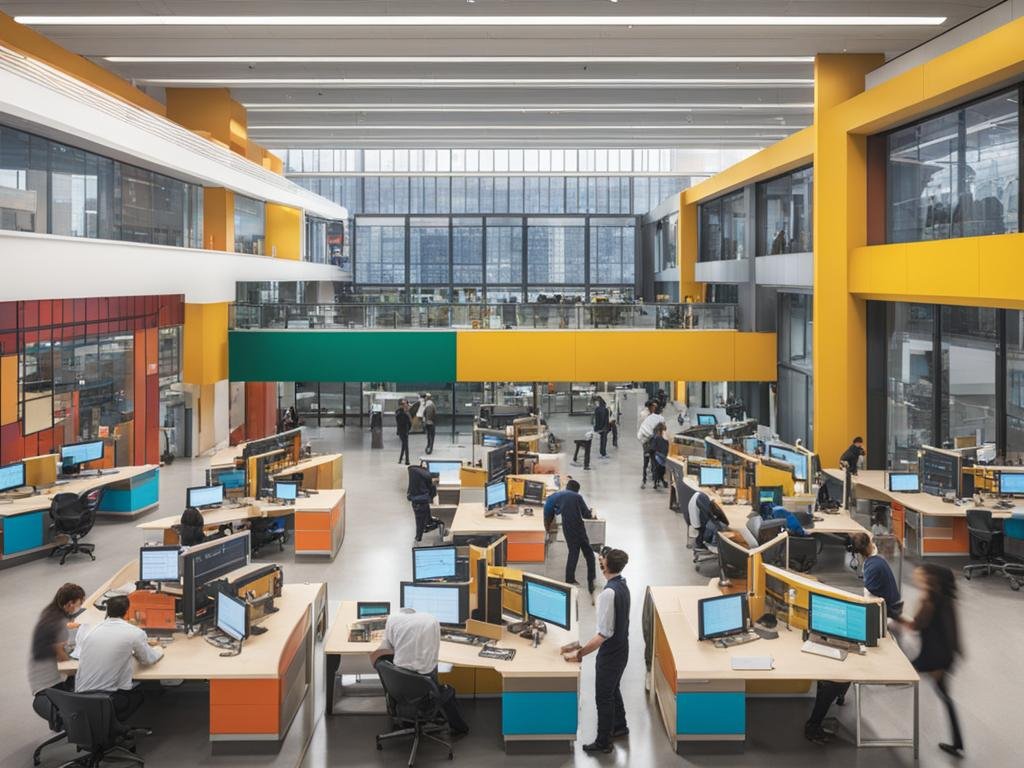
Table: Pros and Cons of Technical Colleges
| Pros | Cons |
|---|---|
| Faster program durations compared to traditional four-year colleges | The cost of tuition and fees |
| Focus on career skills rather than extensive general education requirements | No employment guarantee |
| Potential to earn an associate degree | Limited scheduling options for working students |
| Possibility of transferring credits to other programs |
Pros and Cons of Technical Colleges
Technical colleges offer several benefits for students looking for career preparation and specific training. Here are some of the pros and cons to consider when deciding whether a technical college is the right choice for you:
Pros of Technical Colleges
- Career Preparation: Technical colleges focus on providing practical skills and knowledge that are directly applicable to specific careers. This career-focused education can give graduates a competitive edge in the job market.
- Associate Degree: Many technical colleges offer associate degree programs that can be completed in a shorter duration compared to traditional four-year colleges. These degrees provide a solid foundation in a specific field and can open up more job opportunities.
- Transferable Credits: Some technical college credits may be transferable to other programs or colleges if students decide to further their education. This flexibility allows students to continue their studies and pursue higher levels of education if desired.
Cons of Technical Colleges
- Cost: The cost of tuition and fees for technical colleges can vary. It’s important to consider the financial investment required and explore scholarship, grant, or financial aid options to make education more affordable.
- Employment Guarantee: While technical colleges provide career-focused education, there is no guarantee of employment after graduation. Students should research the job market in their desired field and consider the demand for their chosen career path.
- Scheduling Options: Technical colleges may have limited scheduling options, which can make it challenging for students who need to balance school with work or other responsibilities. It’s important to consider whether the available schedule aligns with your needs and commitments.
When deciding whether to pursue education at a technical college, it’s essential to consider these pros and cons and evaluate how they align with your career goals, financial situation, and personal preferences for the duration and structure of your education.
| Pros | Cons | |
|---|---|---|
| Career Preparation | ✔️ | |
| Associate Degree | ✔️ | |
| Transferable Credits | ✔️ | |
| Cost | ❌ | |
| Employment Guarantee | ❌ | |
| Scheduling Options | ❌ |
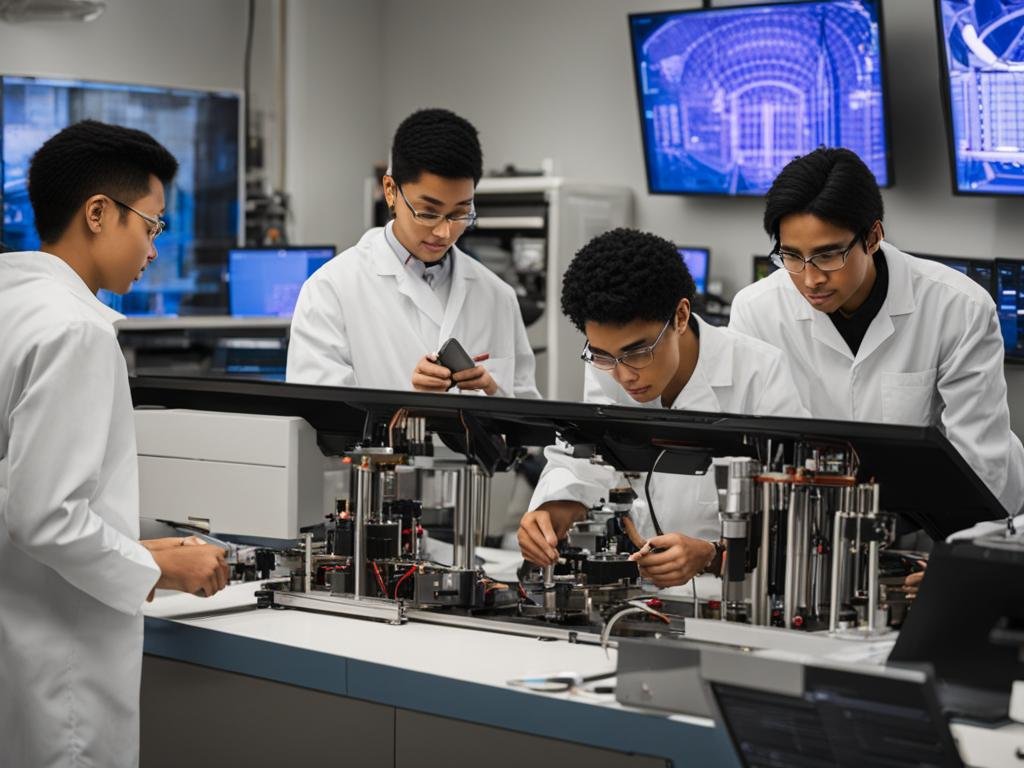
Trade School vs. Technical College
When deciding between trade schools and technical colleges, it’s important to consider the key differences and advantages that each option offers. Both trade schools and technical colleges provide career-focused education and hands-on training, but there are distinct factors that set them apart.
Program Offerings and Career Choices
Trade schools specialize in providing training for specific trades, such as carpentry, cosmetology, or automotive technology. These programs offer focused education tailored to a particular industry. On the other hand, technical colleges offer a wider range of programs, including associate degrees and sometimes bachelor’s degrees, in various fields such as healthcare, information technology, or business administration.
While trade schools offer a direct path to a specific trade, technical colleges provide more diverse career options. Students who are certain about their desired career path may find trade schools beneficial for their focused training. Those who want more flexibility in exploring different career options may find technical colleges better suited to their needs.
Transferable Credits
Another important consideration is the transferability of credits. Technical colleges often offer the opportunity to transfer credits to other programs or institutions if students decide to pursue further education. This can be advantageous for students who may want to continue their education and earn a bachelor’s degree after completing an associate degree at a technical college. In contrast, trade schools typically do not award transferable credits.
Choosing the Right Path
The choice between trade school and technical college ultimately depends on the specific career goals and educational preferences of the individual student. It’s essential to research and evaluate program offerings, accreditation, career paths, and personal interests to make an informed decision. Consider factors such as the desired field of study, program duration, transferability of credits, and whether hands-on training or general education coursework is a priority.
| Trade School | Technical College | |
|---|---|---|
| Focus | Specialized training in specific trades | Diverse career options across various fields |
| Transferable Credits | No | Yes |
| Program Duration | Varies (typically shorter) | Varies (may include associate or bachelor’s degrees) |
| Cost | Varies | Varies |
| Job Prospects | Specific to trade | Various career options |
How to Choose Between Trade School and Technical College
Choosing between trade school and technical college requires careful consideration of several factors, including vocational subjects, community colleges, accreditation, general education courses, postsecondary education, and career goals. Students interested in specific vocational subjects may find that trade school programs provide focused training in their desired field. Trade schools often offer hands-on learning experiences and specialized programs tailored to specific trades, such as carpentry or cosmetology. On the other hand, technical colleges offer a broader range of programs and may provide transferable credits, making them a better fit for students seeking a more generalized education.
One important aspect to consider is accreditation. Both trade schools and technical colleges should be accredited by recognized accrediting bodies. Accreditation ensures that the institution meets certain quality standards and that the education received will be recognized by employers and other educational institutions. It is crucial to verify the accreditation status of any school or program before making a decision.
Another factor to consider is the inclusion of general education courses. Technical colleges often require students to complete general education coursework in addition to their career-focused training. This can provide a more well-rounded education and may offer flexibility in future career paths. Trade schools, on the other hand, typically focus solely on the specific skills and knowledge needed for a particular trade. This can be advantageous for students who are certain of their desired career path and want to enter the workforce as quickly as possible.
| Trade School | Technical College |
|---|---|
| Specialized training for specific trades | Broader range of program options |
| Hands-on learning experiences | Potential transferable credits |
| No or limited general education courses | Inclusion of general education courses |
| Faster entry into the workforce | Potential for a more well-rounded education |
| Lower program costs | Possibility of earning an associate or bachelor’s degree |
In summary, choosing between trade school and technical college requires careful consideration of various factors, including your career goals, desired field of study, program duration, transferability of credits, and personal preferences for hands-on training or general education coursework. Researching and evaluating program offerings, accreditation, and career paths can help you make an informed decision that aligns with your educational and career goals. Remember, the choice between trade school and technical college is subjective and depends on your individual circumstances and aspirations.
Also Read : Unlock Your Potential: Become A Successful Technical Engineer
Conclusion
Technical schools and trade schools offer valuable alternatives to traditional four-year colleges for students seeking career-focused education and specific training in skilled trades. These schools provide hands-on learning experiences, specialized programs, and the opportunity to develop job skills that are in high demand in the workforce.
Trade schools focus on providing specific training for trades such as carpentry, cosmetology, and healthcare, while technical colleges offer a broader range of programs that span various industries. Both options prioritize practical training and job skills, allowing students to enter the workforce quickly and efficiently.
When deciding between a technical school and a trade school, it’s important for individuals to consider their career goals and educational preferences. Those seeking a focused education in a specific trade may find trade schools more suitable, while those looking for a broader education and the potential transferability of credits may lean towards technical colleges.
Ultimately, the choice between a technical school and a trade school depends on the individual student’s aspirations and desired career path. By considering factors such as program offerings, cost, job placement rates, and personal interests, students can make informed decisions that align with their goals and set them on a path towards a successful career.
FAQs
A: A technical school is an educational institution that offers specialized courses and training programs in specific trades or careers, providing students with the skills needed to pursue career paths in fields such as welding, electronics, aircraft maintenance, and more. Unlike a traditional 4-year college, technical schools may offer more flexible and industry-focused curriculums, taking less time and costing less overall.
Q: What are the benefits of attending a technical school?
A: Attending a technical school may be beneficial for individuals who want to start a career in a specific trade or industry. It allows students to focus on their field of choice, acquire practical skills, and get started in their careers in a shorter time frame compared to a 4-year college. Technical schools also often provide career services to help graduates find job opportunities in their respective fields.
Q: How long does it take to complete a program at a technical school?
A: The duration of programs at technical schools can vary based on the specific trade or career path. Some programs may take two years to complete, while others may be shorter or longer. The duration depends on the specialized courses and skills needed in the chosen field of study.
Q: What are the career opportunities after completing a program at a technical school?
A: Graduates of technical schools have the opportunity to pursue various career paths in the industry they have studied. This can include careers as technicians, mechanics, electricians, aircraft maintenance professionals, and more. The specialized training and education received at technical schools can open doors to a range of career opportunities in different occupational fields.
Q: How is a technical school different from a traditional 4-year college?
A: The main difference between a technical school and a traditional 4-year college lies in the focused, specialized nature of the education provided. Technical schools offer industry-specific training and education, whereas traditional colleges often provide broader academic curriculums. Technical schools also tend to take less time and may be more cost-effective for individuals looking to enter certain technical or trade careers.
Q: I’m interested in pursuing a career in a specific trade, but I’m not sure which school to choose. Can you help?
A: If you’re interested in pursuing a career in a specific trade but aren’t sure which technical school to choose, contact us today. Our team can provide guidance and information to help you find the right technical school that aligns with your career goals and interests.
Q: Do technical schools offer associate’s degrees?
A: Yes, many technical schools offer associate’s degrees in various fields of study. These degrees provide students with a solid foundation in their chosen trade or career, enhancing their job prospects and opportunities for advancement within their industries.
Q: What is a “trade” as it relates to technical schools?
A: In the context of technical schools, a “trade” refers to a specific skill or occupation that requires specialized training and expertise. Technical schools focus on providing education and training for various trades, equipping students with the skills needed to excel in their chosen career paths.
Q: Are there prerequisites for attending a technical school?
A: While specific prerequisites may vary by school and program, most technical schools require applicants to have a high school diploma or equivalent. Some programs may also have additional requirements, such as specific literacy or occupational skills needed for certain trades.
Q: What kind of support do technical schools offer to students?
A: Technical schools often provide comprehensive support to their students, including career services to help graduates find employment opportunities, access to industry professionals for networking and mentorship, and assistance in preparing for certification exams relevant to their chosen fields of study.
Source Links
- https://www.educationcorner.com/vocational-technical-schools-guide/
- https://www.forbes.com/advisor/education/trade-schools/guide-to-trade-school-vocational-programs/
- https://www.bestcolleges.com/trades/trade-school-vs-technical-college/

